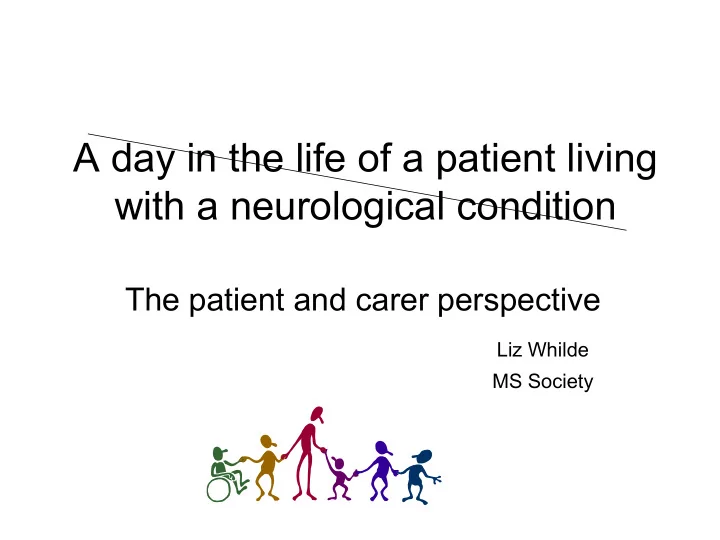

A day in the life of a patient living with a neurological condition The patient and carer perspective Liz Whilde MS Society
Living with neurological conditions The patient and carer perspective Liz Whilde MS Society
1:6 people in UK living with long term neurological condition Epilepsy Migraine Parkinson’s Disease Motor Neurone Disease Spina Bifida Cerebral Palsy Acquired Brain Injury Multiple Sclerosis Huntington’s Disease Dystonia Neurofibromatosis ……………………
‘An ordinary life……’ • 10 million people living with LTNC in UK • 1 million disabled • 350,000 require help for most of daily activity • 850,000 people care for someone with a neurological condition • 8 million are able to manage their lives on a daily basis Neurological Alliance: Neuro Numbers The National Service Framework (NSF) for Long Term Neurological Conditions (DH 2005)
‘A Long Term Neurological Condition is the 3 rd most common reason for seeing a GP’ NHS National Workforce Projects • Onset of symptoms (pre diagnosis) • On diagnosis • Managing symptoms & possible deterioration of condition • Possible palliative care
What people living with LTNC say: • Continuity • Lack of contact ‘I only get to see my Neurologist every 2 years, so my regular checks with my GP and Practice Nurse are very important to me’ Person living with Parkinson’s Disease
• Importance of timing of contact • Time • Willingness to seek specialist information & support ‘I was devastated when I was told that I had HD and needed time to think about what that meant. My GP really helped by listening to my fears and helping me find out where to get information and help’ Person living with Huntington’s Disease
• Timely referral to specialist services • Signposting to sources of support for patient & family ‘After our son’s ‘It seemed to take forever for my accident, we don’t symptoms to be taken seriously, recognise the and I became very depressed which person he’s meant my other symptoms got become. We don’t worse and I know I made life know where to turn difficult for my family who didn’t to – It is destroying know how to help me’ our family’ Person living with MS Mother of person with acquired brain injury
• Someone with special interest in neurological conditions ‘I wish someone in my GP practice knew more ‘I don’t expect about what it’s like to my GP to know live with this (MND) everything about every day’ MS, but I would like her not to put everything down to my MS’
• ‘No decision about me, without me’ • Need to be able to judge pros & cons of options to make informed decisions • Direct questions related to possible symptoms ‘My GP listens to me ‘We sit outside the waiting room and discusses and take bets on what line the options with me consultant will use – “how are before writing a you?”, “what would you like me prescription. I feel to do?”, or “do you want me to involved and feel that change your tablets?” How are she values my we supposed to know?’ experience & opinion’ Person living with epilepsy Person living with PD
Support for you….. • Specialised services • Local support agencies • Other GPs with special interest in neurology • 3 rd Sector organisations ………………
• Information & education • Support groups ‘Headway has helped me keep a diary about • Regional workers when I get angry and my mood swings so • Specialist support that when I go to the GP I have all the information I need so ‘My GP showed me the that he can help me’ MS Society website and explained how I could get Person with acquired reliable information and brain injury support which has really helped to alleviate some of my worries and helped me manage some of my own symptoms on my own’
YHANO Yorkshire & the Humber Association of Neurological Organisations ‘A wealth of knowledge and skills on your doorstep’
Recommend
More recommend